Wastewater
The City's sewer unit comprises approximately 150 miles of sewer lines ranging in diameter from four to eight inches, and 25 strategically-located lift stations. Once collected, all sewage is treated at the Coneross Creek Wastewater Treatment Plant in the County (the "Sewer Plant"), which is owned by the County and operated by the Sewer Commission.
The Sewer Plant began operating in 1980, with an initial design treatment capacity of 5.0 MGD. The Sewer Plant was last upgraded with the proceeds of State Revolving Loan funds in 1996 to its current design treatment capacity of 7.8 MGD. To support the Sewer Plant, the Sewer Commission also operates 15 pump stations and maintains 70 miles of trunk lines.
Because the Sewer Plant also serves the Cities of Walhalla and Westminster, as well as other unincorporated areas of the County, there are no other competing sewer service providers in the areas served by the City.
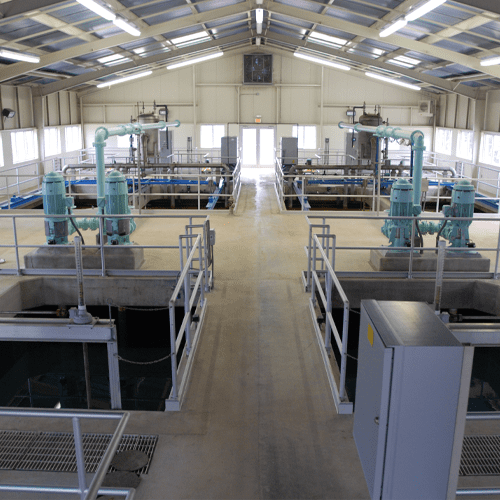
F.O.G. Control Program
For more information about the Fats, Oils, & Grease Control Program, call us at 864-916-1501 or email cmorgan@seneca.sc.us
To Flush or Not to Flush?
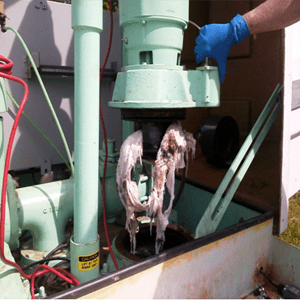
You'd be surprised at the things found in sewer systems; anything from socks, underwear, diapers, plastic bags, cell phones, etc. And of course there is that pesky stuff called grease and animal fats. These things may go down a drain, but somewhere down the line it's going to cause a problem.
Sewer systems are comprised of many different components; sewer mains, service lines, manholes, lift stations, forced mains, etc. Everything that goes down a drain line in a home or business must be controlled within all the different components of a sewer system. If it can't be handled, then you guessed it, clogs happen, sewer backs up; overflowing in to homes, businesses or the outside environment.
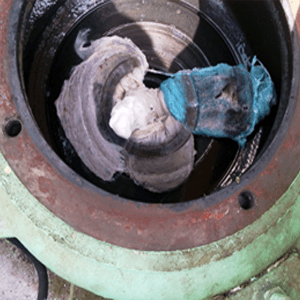
This picture shows a disposable diaper and a blue wash cloth that became lodged in a sewer lift station.
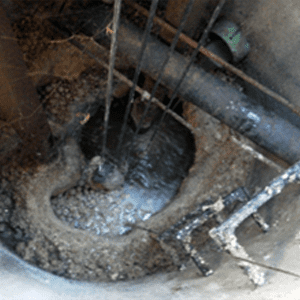
The affects of grease and animal fats in a lift station.
Any of these situations can result in temporary loss of sewer service. The more operational issues, the more operations cost, the more we all pay for utility services. It’s that simple. In order to keep utility rates low, operational costs must remain low. When operation costs increase, it’s the customer who ultimately bears the cost.
In addition, if you see anyone illegally dumping into any sewer manhole, please call the Seneca Police Department at 864-885-2718.
Wet Wipes and Paper Towels?
Wet wipes and paper towels may be good for a number of applications, but they’re not for a sewer system. These items, when introduced into the system, tend to combine with other materials within the system, namely grease and animal fats (very bad for sewer systems!) When these items eventually make it to a sewer lift station, they form a mat which keeps pumps from working properly. These products may be sold as “sewer/septic friendly”. Please do not believe that. Below is an example.
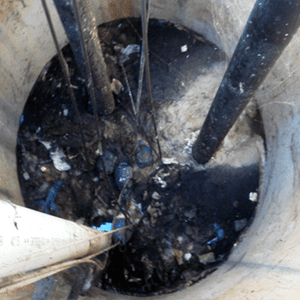
This type of issue also affects septic systems. A mat is formed on the surface of the septic tank and does not allow proper settling, thus limiting the capacity and effectiveness of the septic system.
Please be considerate of your sewer system.
Property Damage and Repair Costs
Sewer backups into homes and businesses can cause extensive property damage. Grease and animal fats are the No. 1 contributor to clogs and breakdowns. By pouring bacon grease, turkey grease, etc. down the drain, everything from the sink to the system can become clogged. When a backup occurs, it can cause expensive repairs to the property, temporary relocation, insurance cost increases, etc.
Public Health and Safety
Here at Seneca Light & Water, our goal is to provide utility services safely and efficiently. When those services are interrupted, then our crews perform system repairs in the same manner, safely and efficiently.
When sewer service is interrupted, it has the potential to expose the public and utility employees to health and safety issues. Spills and overflows into homes, businesses, yards, lakes and streams, are something we all want to avoid.
So, the next time you put something down the drain, think "can this be placed into a trash bag?" and help avoid unnecessary system interruptions.
Please take the time to avoid pouring grease and/or fats down the drain as well as other materials like rags and wipes that don't belong in the sewer. You can save yourself (and your utility) time and money!
We hope this information helps. If you have any questions, please call Customer Service at 864-885-2723
Office
| Location: 251 E North 2nd St. Seneca, SC 29678 |
|
| Hours: Monday - Friday 8:00AM - 5:00PM |
Staff
| Director of Utilities: Joshua Riches |
Supervisor of Billing: Rita Swaney |
| Assistant Supervisor of Billing: Rebecca Bellotte |
Water Plant Supervisor: Steve Fletcher |
| Electrical Supervisor: Robert Lance |
Water/Sewer Superintendent: Chris Morgan |
Contact
| Phone: 864-885-2723 |
|
| Fax: 864-888-0865 |
|
| Email: customerservice@seneca.sc.us |
|
| Mailing: P.O. Box 4773 Seneca, SC 29679 |
